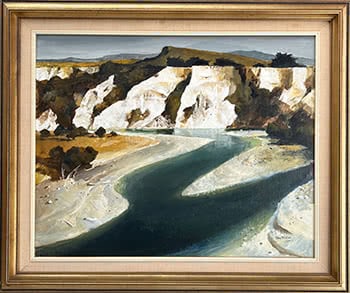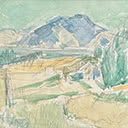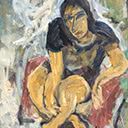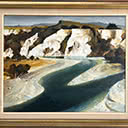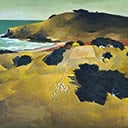Rangitikei River
60 x 75 cm
est. $30,000 - 40,000
Years ago I went far up the Rangitikei beyond Taihape to visit my friend David Russell, whose farm at that time was as far as you could drive up the river into the bush. The river is so deep between high papa cliffs that down at the bottom where the river flows there is only a sort of twilight, even on a sunny day. Once I crossed the gorge at a wider place in the bush in a tray slung on a logger's wire rope, and we sat in mid-air watching a large trout feed in the river below where a patch of sun broke through the over-hanging bush. From that time on I have painted the river up and down its length, and always there has been delight in painting those lovely cliffs that are that most paintable of all colours - white.
Text: Peter McIntyre's New Zealand, A H & A W Reed 1964
The Rangitikei River, it's headwaters located to the southeast of Lake Taupo in the Kaimanawa Ranges stretches 185 kilometres, making it one of the New Zealand's longest rivers. It flows from the Central Plateau south past Taihape, Mangaweka, Hunterville, Marton, Bulls and to the South Taranaki Bight at Tangimoana, 40 kilometres southeast of Wanganui. The river gives its name to the surrounding Rangitikei District. In 1897 the river flooded and all six bridges over it were damaged or destroyed. The port at the mouth of the river was also washed away and never rebuilt. The river is a popular leisure and recreation area for jetboating, white water rafting, kayaking, fishing and includes public camping grounds along its banks. Its sheer vertical papa (clay) cliffs, unique to this part of New Zealand, and deep canyons provide the perfect setting for adventure activities. The lush green bush is the crowning glory of my country and in its depths the tui and bellbird sing the purest song of them all.
The river in the painting flows out of the bush, cutting deep into the white papa clay to make cliffs that catch the sun and the moon all along its course.
Text: Peter McIntyre's Pacific, A H & A W Reed 1966

